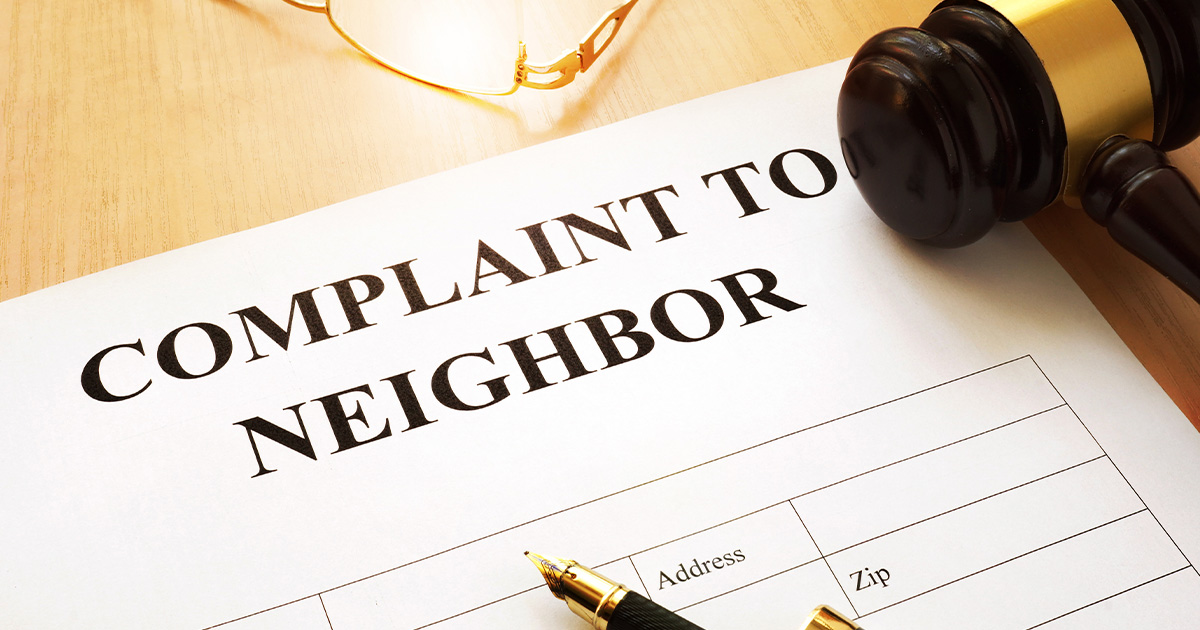Recently, Taylor, Eldridge & Endres Associate Attorneys, Melissa Schlactus and Beth Gazes, spoke to members and colleagues of the Suffolk County Bar Association.
Recently, Taylor, Eldridge & Endres Associate Attorneys, Melissa Schlactus and Beth Gazes, spoke to members and colleagues of the Suffolk County Bar Association presenting recent case law and anecdotes about neighbor-against-neighbor disputes, an issue that most association Boards and landlords face from time to time (or perhaps – unfortunately – frequently). The purpose of the lecture was to discuss whether and how the Board or landlord should respond or intervene in neighbors’ disputes.
Ms. Schlactus discussed notable decisions in community association law, including Bacharach v. Board of Mgrs. of the Brooks-Van Horn Condominium. There, a downstairs neighbor complained that the noise of children running, jumping, and playing in the unit above him amounts to a private nuisance, and alleged a failure of the upstairs family to both adhere to the community’s alteration policy and properly carpet the unit. This downstairs neighbor brought an action against both the upstairs neighbor and Board. Noting the realities associated with “normal apartment occupancy,” the private nuisance claim against the upstairs neighbor was dismissed. As to the claims brought against the Board for failure to intervene and remediate the issues between the neighbors, i.e., breach of fiduciary duty and contract, the court was unwilling to dismiss the claims against them because the Board could not allege that it seriously and consistently investigated the noise complaint – namely that the upstairs apartment was not in compliance with the carpet requirement or the alteration policy.
When viewed in tandem with a recent administrative decision, dated February 2022, the lesson is obvious.
As explained by Ms. Schlactus, Boards should act consistently, investigate each complaint equally, and keep detailed notes. In addition, and as equally important, a Board’s attempt at defusing the disputes – while remaining impartial and not contributing to the issue – is best practice.
This administrative decision, In re Alexandra J. Dolan, relies heavily on the Board’s showing that “they exhausted all remedies within their power to reconcile the matter amicably[.]” Further, although noted that the Board has no duty to police the behaviors of the member home owners, those actions of the Board attempting to aid in the conciliation efforts between the neighbors were recognized by the judge as those relieving the Board from liability. Namely, the Board “sent letters to both parties threatening to fine both parties if they could not resolve the matter . . . [and e]ach time [the Board] sent a letter to [the complaining neighbor], the same letter was sent to [the other] informing each party of how [the Board] planned to hold them both accountable if the disputes continued because the parties were now disrupting other residents with their behavior.” In other words, because the Board took the complaint seriously, investigated the complaint, treated each equally, and attempted to the fullest extent permitted by its authority to help solve the dispute, the Board was released from liability in this discrimination action.
As for similar issues arising in the context of landlord-tenant relationships, Ms. Gazes summed up Francis v. Kings Park Manor, Inc., together with its extensive history of district and circuit court holdings, explaining that, as held by the Court, landlords have no affirmative duty to intervene between neighbor since they “cannot be presumed to have the degree of control over tenants that would be necessary to impose liability under the FHA for tenant-on-tenant misconduct.”
Francis is a discrimination action brought by a tenant against his former neighbor, the landlord, and the landlord’s management company.
Mr. Francis alleged as part of his breach of contract claim that the failure of the landlord to stop the racially-motivated harassment against him by the neighbor amounts to discrimination because, according to the lease, he has a right to quiet enjoyment of his apartment. Notable is that this decision was decided in the context of the Fair Housing Act, and the plaintiff alleged that the landlord’s failure to intervene was rooted in the landlord’s animus towards the plaintiff. Just as with the lesson above for community associations, as long as the landlord does not add to the issue, and treats everyone equally, a landlord puts itself in a position of likely limited liability. Although Francis was decided in the landlord-tenant context, this decision may also apply to community associations because they are considered housing providers under the FHA.
Mss. Schlactus and Gazes are grateful to the Suffolk County Bar Association for the opportunity to share this knowledge and information. Attendees were entitled to earn continuing legal education credits as a result of this presentation.


